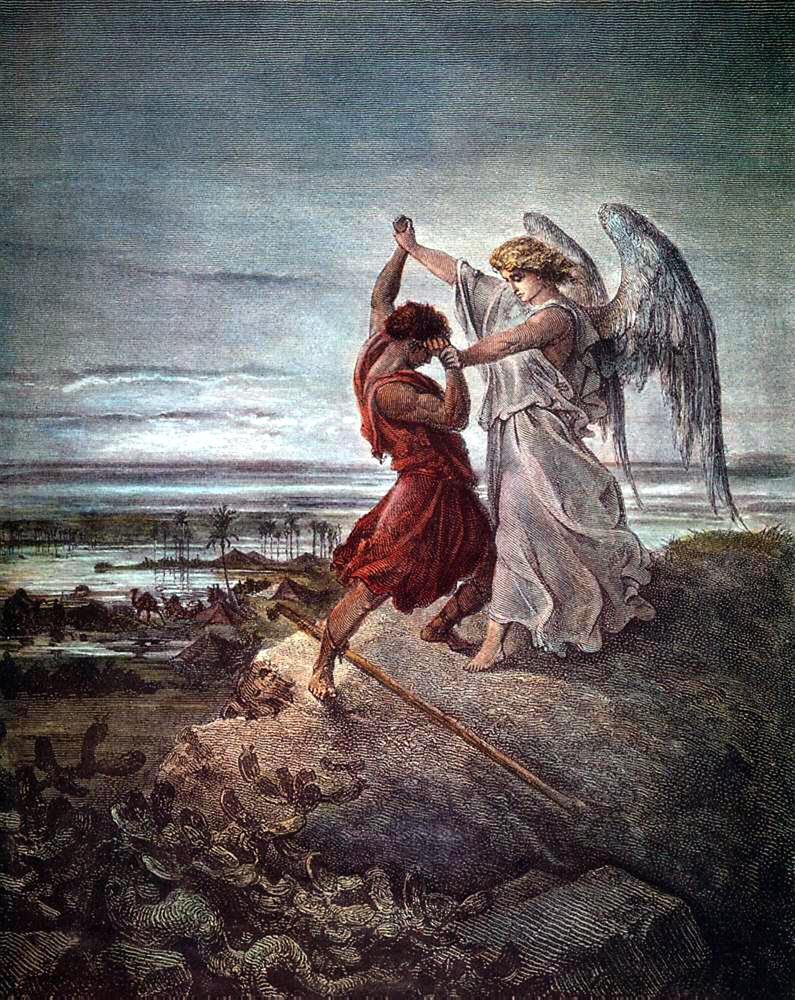I have been writing about this elsewhere and some objections came up which are easily dismissed. Anyway here is the original passage:
And Jacob was left alone; and there wrestled a man with him until the breaking of the day. And when he saw that he prevailed not against him, he touched the hollow of his thigh; and the hollow of Jacob's thigh was strained, as he wrestled with him. And he said: 'Let me go, for the day breaketh.' And he said: 'I will not let thee go, except thou bless me.' And he said unto him: 'What is thy name?' And he said: 'Jacob.' And he said: 'Thy name shall be called no more Jacob, but Israel; for thou hast striven with God and with men, and hast prevailed.' And Jacob asked him, and said: 'Tell me, I pray thee, thy name.' And he said: 'Wherefore is it that thou dost ask after my name?' And he blessed him there. And Jacob called the name of the place Peniel: 'for I have seen God face to face, and my life is preserved.' And the sun rose upon him as he passed over Peniel, and he limped upon his thigh. Therefore the children of Israel eat not the sinew of the thigh-vein which is upon the hollow of the thigh, unto this day; because he touched the hollow of Jacob's thigh, even in the sinew of the thigh-vein. [Gen 32:25 - 33]
Jewish tradition has always maintained that the angel here gave his name to Jacob. The angel wrenched the "hip" or "thigh" (Hebrew kaf-yerech, Gen 32:26) that was the symbolic source of his fertility. When the same word reappears in Gen 46:26 - "All the souls that came with Jacob into Egypt, which came out of his loins, besides Jacob's sons' wives, all the souls were three score and six" - clearly underscore that the word here means 'sexual organ' or the part of the body which is responsible for fertility.
There is nothing in the Genesis narrative that prevents Jacob from being understood as having been castrated (or his testicles crushed) in Genesis 32. Nine months usually separate conception from birth and all that appears between the birth of Benjamim (Samaritan spelling) and the angel crushing Jacob's balls are (a) Jacob running to meet Esau, (b) Jacob going to Shechem, and then (c) back again to Bethel (which according to the Samaritans is the Sanctuary at Gerizim i.e. 'right there' in the immediate environs).
An objection was raised by someone arguing that Benjamin was born to Rachel after God told Jacob to be fruitful and multiply (Genesis 35:11a). But the context of the story makes clear that this blessing IMMEDIATELY PRECEDES the birth of Benjamin:
And God said to him, "I am God Almighty; be fruitful and increase in number. A nation and a community of nations will come from you, and kings will come from your body. The land I gave to Abraham and Isaac I also give to you, and I will give this land to your descendants after you." Then God went up from him at the place where he had talked with him. Jacob set up a stone pillar at the place where God had talked with him, and he poured out a drink offering on it; he also poured oil on it. Jacob called the place where God had talked with him Bethel.
Then they moved on from Bethel. While they were still some distance from Ephrath, Rachel began to give birth and had great difficulty. And as she was having great difficulty in childbirth, the midwife said to her, "Don't be afraid, for you have another son." As she breathed her last—for she was dying—she named her son Ben-Oni. But his father named him Benjamim (son of days).
The reality is however that this blessing was always understood to apply to the nation of Israel as a whole. Indeed as Rashi notes "'Be fruitful and multiply' - Since Benjamin was not yet born even though she was already pregnant with him." As such there is no reason to think that early Christians reading this story COULDN'T have understood that (a) Rachel was pregnant BEFORE Peniel and gave birth to Benjamin thereafter. Indeed it seems to be the correct reading ...
skip to main |
skip to sidebar












Drawing on vellum. From MS CLXV, Biblioteca Capitolare, Vercelli, a compendium of canon law produced in Northern Italy ca. 825













































Burning of Arian Books After Nicaea

Drawing on vellum. From MS CLXV, Biblioteca Capitolare, Vercelli, a compendium of canon law produced in Northern Italy ca. 825


Adversus Marcionem 1.19 and Antoninus Pius's Alexandrian "Zodiac Coins" of 144/145 CE















First Argument for the Alexandrian Origins of Marcion

Second Argument for the Alexandrian Origins of Marcion

Third Argument for the Alexandrian Origins of Marcion

Fourth Argument for the Alexandrian Origins of Marcion

Fifth Argument for the Alexandrian Origins of Marcion

Conclusion

Bonus

First Piece of Evidence

Second Piece of Evidence


Third Piece of Evidence

Preliminary Conclusion

Overriding Point

Bottom Line


In Summa:

Last Word

My Academic Papers
- • Book Draft - work in progress
- • Google Docs
- • Admin -->










